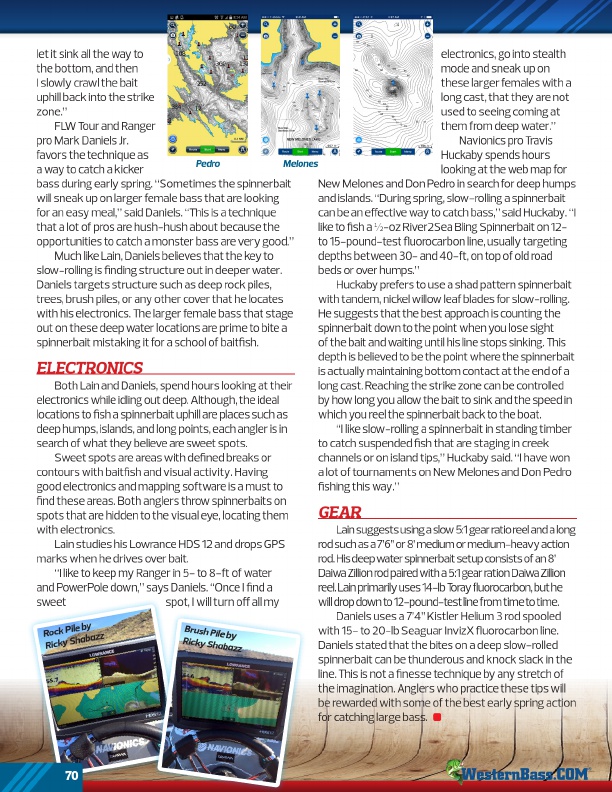
let it sink all the way to
electronics, go into stealth
the bottom, and then
mode and sneak up on
I slowly crawl the bait
these larger females with a
uphill back into the strike
long cast, that they are not
zone.”
used to seeing coming at
FLW Tour and Ranger
them from deep water.”
pro Mark Daniels Jr.
Navionics pro Travis
favors the technique as a way to catch a kicker
Pedro
Melones
Huckaby spends hours looking at the web map for
bass during early spring. “Sometimes the spinnerbait New Melones and Don Pedro in search for deep humps
will sneak up on larger female bass that are looking
and islands. “During spring, slow-rolling a spinnerbait
for an easy meal,” said Daniels. “This is a technique
can be an effective way to catch bass,” said Huckaby. “I
that a lot of pros are hush-hush about because the
like to fish a ½-oz River2Sea Bling Spinnerbait on 12-
opportunities to catch a monster bass are very good.” to 15-pound-test fluorocarbon line, usually targeting
Much like Lain, Daniels believes that the key to
depths between 30- and 40-ft, on top of old road
slow-rolling is finding structure out in deeper water.
beds or over humps.”
Daniels targets structure such as deep rock piles,
Huckaby prefers to use a shad pattern spinnerbait
trees, brush piles, or any other cover that he locates
with tandem, nickel willow leaf blades for slow-rolling.
with his electronics. The larger female bass that stage He suggests that the best approach is counting the
out on these deep water locations are prime to bite a
spinnerbait down to the point when you lose sight
spinnerbait mistaking it for a school of baitfish.
of the bait and waiting until his line stops sinking. This
ELECTRONICS
depth is believed to be the point where the spinnerbait is actually maintaining bottom contact at the end of a
Both Lain and Daniels, spend hours looking at their long cast. Reaching the strike zone can be controlled
electronics while idling out deep. Although, the ideal
by how long you allow the bait to sink and the speed in
locations to fish a spinnerbait uphill are places such as
which you reel the spinnerbait back to the boat.
deep humps, islands, and long points, each angler is in
“I like slow-rolling a spinnerbait in standing timber
search of what they believe are sweet spots.
to catch suspended fish that are staging in creek
Sweet spots are areas with defined breaks or
channels or on island tips,” Huckaby said. “I have won
contours with baitfish and visual activity. Having
a lot of tournaments on New Melones and Don Pedro
good electronics and mapping software is a must to
fishing this way.”
find these areas. Both anglers throw spinnerbaits on spots that are hidden to the visual eye, locating them
GEAR
with electronics.
Lain suggests using a slow 5:1 gear ratio reel and a long
Lain studies his Lowrance HDS 12 and drops GPS
rod such as a 7’6’’ or 8’ medium or medium-heavy action
marks when he drives over bait.
rod. His deep water spinnerbait setup consists of an 8’
“I like to keep my Ranger in 5- to 8-ft of water
Daiwa Zillion rod paired with a 5:1 gear ration Daiwa Zillion
and PowerPole down,” says Daniels. “Once I find a
reel. Lain primarily uses 14-lb Toray fluorocarbon, but he
sweet
spot, I will turn off all my
will drop down to 12-pound-test line from time to time.
RRoicckkyPSilehabbyazz
RBircuksyhSPhilaebbayzz
Daniels uses a 7’4’’ Kistler Helium 3 rod spooled with 15- to 20-lb Seaguar InvizX fluorocarbon line. Daniels stated that the bites on a deep slow-rolled spinnerbait can be thunderous and knock slack in the
line. This is not a finesse technique by any stretch of
the imagination. Anglers who practice these tips will
be rewarded with some of the best early spring action
for catching large bass.
70 ®